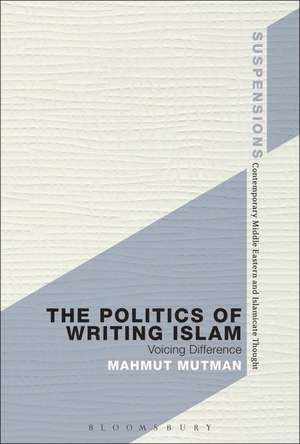The Politics of Writing Islam: Voicing Difference: Suspensions: Contemporary Middle Eastern and Islamicate Thought
Autor Professor Mahmut Mutmanen Limba Engleză Paperback – 20 mai 2015
Din seria Suspensions: Contemporary Middle Eastern and Islamicate Thought
- 28%
 Preț: 405.76 lei
Preț: 405.76 lei - 22%
 Preț: 237.28 lei
Preț: 237.28 lei - 23%
 Preț: 172.99 lei
Preț: 172.99 lei - 12%
 Preț: 216.16 lei
Preț: 216.16 lei - 30%
 Preț: 567.99 lei
Preț: 567.99 lei - 22%
 Preț: 256.20 lei
Preț: 256.20 lei - 13%
 Preț: 257.50 lei
Preț: 257.50 lei - 22%
 Preț: 256.85 lei
Preț: 256.85 lei - 23%
 Preț: 171.39 lei
Preț: 171.39 lei - 13%
 Preț: 229.05 lei
Preț: 229.05 lei - 13%
 Preț: 257.50 lei
Preț: 257.50 lei - 13%
 Preț: 238.76 lei
Preț: 238.76 lei - 22%
 Preț: 231.81 lei
Preț: 231.81 lei - 22%
 Preț: 224.21 lei
Preț: 224.21 lei - 23%
 Preț: 198.12 lei
Preț: 198.12 lei - 23%
 Preț: 198.68 lei
Preț: 198.68 lei - 24%
 Preț: 188.82 lei
Preț: 188.82 lei
Preț: 257.97 lei
Preț vechi: 295.64 lei
-13% Nou
Puncte Express: 387
Preț estimativ în valută:
49.36€ • 51.54$ • 40.76£
49.36€ • 51.54$ • 40.76£
Carte tipărită la comandă
Livrare economică 16-30 aprilie
Preluare comenzi: 021 569.72.76
Specificații
ISBN-13: 9781474237611
ISBN-10: 1474237614
Pagini: 272
Dimensiuni: 156 x 234 x 25 mm
Greutate: 0.39 kg
Editura: Bloomsbury Publishing
Colecția Bloomsbury Academic
Seria Suspensions: Contemporary Middle Eastern and Islamicate Thought
Locul publicării:London, United Kingdom
ISBN-10: 1474237614
Pagini: 272
Dimensiuni: 156 x 234 x 25 mm
Greutate: 0.39 kg
Editura: Bloomsbury Publishing
Colecția Bloomsbury Academic
Seria Suspensions: Contemporary Middle Eastern and Islamicate Thought
Locul publicării:London, United Kingdom
Caracteristici
Asks why Islam is rarely discussed in theoretical discussions on religion, unlike Christianity and Judaism
Notă biografică
Mahmut Mutman teaches cultural and critical theory and is the co-ordinator of the Program in Cultural Studies at Istanbul Sehir University, Turkey. He has widely published on orientalism, postmodernism, nationalism, and Islam.
Cuprins
IntroductionPart I: Ethnographies: Writing Culture1. Writing Culture: the Name of Man2. Native Speaker, Master Audience3. Exchange Past and FuturePart II: Literatures: Crossing Culture 4. Resonance of Light: Reading T.E. Lawrence5. Nomadism or Sovereignty: Location of CulturePart III: Theologies: the Voice of the Other6. Orphan Religion7. Reciting: the Voice of the OtherConclusionBibliographyIndex
Recenzii
A significant contribution ... [Mutman] offers a nuanced analysis ... [and] compelling narratives ... bring[ing] to light many challenges that scholars, writers, and academics face as they venture into identifying otherness within culture or religion ... [This book] introduces readers to a wide range of challenging concepts and discourses and contributes to the debates over appropriating the voice of the other by opening a fresh and long overdue area of research.
Mutman presents a thoughtful critique of a series of postmodern theoreticians and their analyses of Islam and Muslims ... This is essential reading for both students and scholars interested in Islamic studies.
In The Politics of Writing Islam, Mahmut Mutman has produced an admirably clear and finely argued account of the complex problems that arise whenever Islam is posited as an object of knowledge. In critical readings of exemplary works in a variety of fields, ranging from ethnography and travel writing to discussions of gender among Muslim intellectuals and novelists, Mutman explores how Islam typically stands in for something else: culture, nation, identity. With deft support from Jacques Derrida and Gayatri Chakravorty Spivak, Mutman shows how the emergence of a new phase of 'political Islam' in the last four decades marks a crisis of legitimacy, no longer dominated by opposition to neo-colonialism and the West, but a struggle to frame a democratic politics within Islamic discourse.
Whose Islam? When did Islam first become political? This exhilarating and rigorous book ranges from ethnography to literature to theology, hanging out with Pierre Bourdieu in Algeria, debating with Fethi Benslama, Saba Mahmoud, Mehdi Abedi and Michael M. J. Fischer, James Clifford, Alain Badiou, Assia Djebar, and Abdelkabir Khatibi, and shedding light on imperialism, colonialism, global capitalism, Islamic disputation, Sufism, and struggles for democracy from Istanbul to Cairo. Everyone should follow Mutman into the desert with the imperialist adventurer T. E. Lawrence, and Edward Said and Gilles Deleuze, and take to the road with the Sufi nomad Isabelle Eberhardt, who observes, 'I am quite aware this way of life is dangerous, but the moment of danger is also the moment of hope'. The Politics of Writing Islam is a triumph of the spirit of the Qur'an's Sura 30 Ayat 22, in which the very 'variations in your languages and your colours' beckon as revelatory signs against racism and authoritarian identity politics everywhere.
This book is an excellent analysis of the treatment of Muslim societies and Islam in contemporary social theory, literature, and travel writing. Reading a dazzling array of genres, Mahmut Mutman reveals the underlying thread of Orientalist preoccupations that saturates these writings from various Western disciplines. Challenging innovations in postmodern ethnography, Mutman skillfully deconstructs these to demonstrate how anthropology remains a key site for colonial conceptions of the Western subject. The Politics of Writing Islam is indispensable reading for scholars of 'political' Islam as well as those interested in understanding Western investments in their phantasies of Muslim peoples. Mutman's deep familiarity with critical theory secures his position as a leading cultural critic.
The Politics of Writing Islam provides a much-needed critique of existing forms of studying, writing and representing Islam in the West . . . While offering a critical insight into concepts such as writing, power, post-colonialism, difference and otherness on a theoretical level, Mutman reveals a different perspective on Islam by emphasizing its living, everyday and embodied aspects in dynamic relation with the outside world
Mutman presents a thoughtful critique of a series of postmodern theoreticians and their analyses of Islam and Muslims. He deconstructs the existing notions of theoretical knowledge of culture in general, and of the colonized 'other' in particular . [E]ssential reading for both students and scholars interested in Islamic studies.
Mutman presents a thoughtful critique of a series of postmodern theoreticians and their analyses of Islam and Muslims ... This is essential reading for both students and scholars interested in Islamic studies.
In The Politics of Writing Islam, Mahmut Mutman has produced an admirably clear and finely argued account of the complex problems that arise whenever Islam is posited as an object of knowledge. In critical readings of exemplary works in a variety of fields, ranging from ethnography and travel writing to discussions of gender among Muslim intellectuals and novelists, Mutman explores how Islam typically stands in for something else: culture, nation, identity. With deft support from Jacques Derrida and Gayatri Chakravorty Spivak, Mutman shows how the emergence of a new phase of 'political Islam' in the last four decades marks a crisis of legitimacy, no longer dominated by opposition to neo-colonialism and the West, but a struggle to frame a democratic politics within Islamic discourse.
Whose Islam? When did Islam first become political? This exhilarating and rigorous book ranges from ethnography to literature to theology, hanging out with Pierre Bourdieu in Algeria, debating with Fethi Benslama, Saba Mahmoud, Mehdi Abedi and Michael M. J. Fischer, James Clifford, Alain Badiou, Assia Djebar, and Abdelkabir Khatibi, and shedding light on imperialism, colonialism, global capitalism, Islamic disputation, Sufism, and struggles for democracy from Istanbul to Cairo. Everyone should follow Mutman into the desert with the imperialist adventurer T. E. Lawrence, and Edward Said and Gilles Deleuze, and take to the road with the Sufi nomad Isabelle Eberhardt, who observes, 'I am quite aware this way of life is dangerous, but the moment of danger is also the moment of hope'. The Politics of Writing Islam is a triumph of the spirit of the Qur'an's Sura 30 Ayat 22, in which the very 'variations in your languages and your colours' beckon as revelatory signs against racism and authoritarian identity politics everywhere.
This book is an excellent analysis of the treatment of Muslim societies and Islam in contemporary social theory, literature, and travel writing. Reading a dazzling array of genres, Mahmut Mutman reveals the underlying thread of Orientalist preoccupations that saturates these writings from various Western disciplines. Challenging innovations in postmodern ethnography, Mutman skillfully deconstructs these to demonstrate how anthropology remains a key site for colonial conceptions of the Western subject. The Politics of Writing Islam is indispensable reading for scholars of 'political' Islam as well as those interested in understanding Western investments in their phantasies of Muslim peoples. Mutman's deep familiarity with critical theory secures his position as a leading cultural critic.
The Politics of Writing Islam provides a much-needed critique of existing forms of studying, writing and representing Islam in the West . . . While offering a critical insight into concepts such as writing, power, post-colonialism, difference and otherness on a theoretical level, Mutman reveals a different perspective on Islam by emphasizing its living, everyday and embodied aspects in dynamic relation with the outside world
Mutman presents a thoughtful critique of a series of postmodern theoreticians and their analyses of Islam and Muslims. He deconstructs the existing notions of theoretical knowledge of culture in general, and of the colonized 'other' in particular . [E]ssential reading for both students and scholars interested in Islamic studies.
Descriere
The Politics of Writing Islam provides a much-needed critique of existing forms of studying, writing and representing Islam in the West. Through critiquing ethnographic, literary, critical, psychoanalytic and theological discourses, the author reveals the problematic underlying cultural and theoretical presuppositions.












